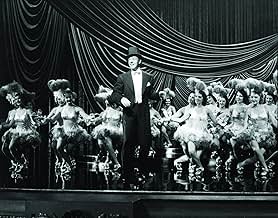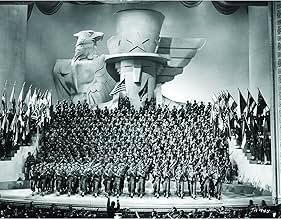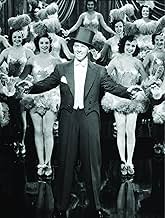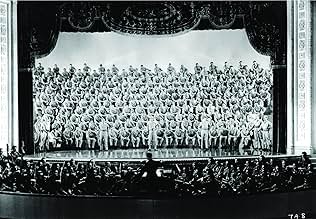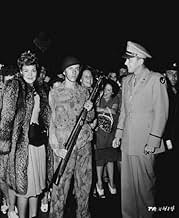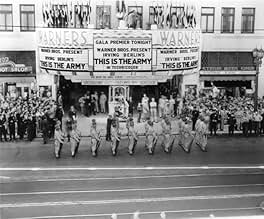IMDb-BEWERTUNG
5,8/10
1407
IHRE BEWERTUNG
Füge eine Handlung in deiner Sprache hinzuA soldier wounded in the War (WWI) becomes a producer and stages a show for the forces.A soldier wounded in the War (WWI) becomes a producer and stages a show for the forces.A soldier wounded in the War (WWI) becomes a producer and stages a show for the forces.
- 1 Oscar gewonnen
- 3 Gewinne & 2 Nominierungen insgesamt
Ronald Reagan
- Johnny Jones
- (as Lt. Ronald Reagan)
Alan Anderson
- Assistant Stage Manager Anderson
- (as 1st Sgt Alan Anderson)
Ezra Stone
- M
- (as M/Sgt. Ezra Stone)
- …
Empfohlene Bewertungen
This movie is a classic of World War II movies. It was made as a moral booster during the war, and includes the music of Irving Berlin. One thing to note especially is the song "Someday I'm going to murder the bugler" which is sung by Irving Berlin himself (wearing his own WWI uniform).
In order to really appreciate this movie you need to understand the world in which it was made, which was a whole lot different than 2004. There was a world war and everyone was concerned about stopping evil. (as opposed to today, where everyone is concerned about how terrorism, or the fight against it, is going to disrupt their daily life)
This movie was made as a way to give people something to feel good about, and show patriotism.
In order to really appreciate this movie you need to understand the world in which it was made, which was a whole lot different than 2004. There was a world war and everyone was concerned about stopping evil. (as opposed to today, where everyone is concerned about how terrorism, or the fight against it, is going to disrupt their daily life)
This movie was made as a way to give people something to feel good about, and show patriotism.
This is the type of musical that Hollywood did best and it sure was popular with the public. However, 65 years later, the film has lost much of its appeal due to changes in movie styles as well as the fact that the film's value as a propaganda tool is now lost--after all, the war has been over since 1945. So what was rousing and exciting then to the folks at home now just seems rather dated and slow--though the film still does have very good production values.
The film is basically a bazillion patriotic songs rolled up into the thinnest of plots. Frankly, I think the film could have been a lot better had the story received greater emphasis and they'd dropped a few musical numbers. This would have given the film a much needed infusion of energy--though again, back during the war years, this wasn't as big a concern.
The story, such as it is, begins during WWI. A group of soldiers (George Murphy, Alan Hale, George Tobias and Charles Butterworth and others) are interested in performing a musical to raise morale and the when they are given permission, the show is a huge hit. Many years later, when WWII arrives, the children of these same men and others put on their new and timely stage show. It's a major success and the soldiers are sent on a tour of the USA to increase the public's patriotism and backing of the war. There's a little more to the plot than this--but not much.
As I said, it's really just an excuse to string together tons of musical and dance numbers--so many that you feel a bit overwhelmed. Some of the numbers are very good, the one with Irving Berlin was interesting (not good--just interesting from a historical sense) and a few were rather bad. The worst was the one that was a minstrel show--something that you'd hoped would have died out by 1943. It was just embarrassing and makes you cringe. Also, in a few separate parts of the film, Joe Lewis made some irrelevant appearances, as he couldn't sing and was as light on his dancing feet as a rhino! He just looked very lost but you can't blame him--he was ordered to appear in the film and since he was a sergeant, he had no choice!
If I could, I'd give the film a score for 1943 (8) and one for today (4 or 5). But, since I can't, I'll give it a 6. Interesting from a historical standpoint but pretty tough going at times, though some of the songs were catchy and the color cinematography was lovely.
As a history teacher, I was a bit concerned with a couple reviews that gave the film a 1. It wasn't nearly that bad and some of the reasons they gave it such a low score seemed petty. One was a diatribe about why they hated Ronald Reagan and really didn't review the film itself. Another was very critical about how the film was propaganda. My answer to that is YES it is propaganda and so what?! Given that it was a life and death struggle for survival in WWII only a knucklehead would see this sort of propaganda as an evil! Should Hollywood have either ignored the war or done pro-Hitler films instead?! Read your history books or talk to some vets before you make such silly assertions.
The film is basically a bazillion patriotic songs rolled up into the thinnest of plots. Frankly, I think the film could have been a lot better had the story received greater emphasis and they'd dropped a few musical numbers. This would have given the film a much needed infusion of energy--though again, back during the war years, this wasn't as big a concern.
The story, such as it is, begins during WWI. A group of soldiers (George Murphy, Alan Hale, George Tobias and Charles Butterworth and others) are interested in performing a musical to raise morale and the when they are given permission, the show is a huge hit. Many years later, when WWII arrives, the children of these same men and others put on their new and timely stage show. It's a major success and the soldiers are sent on a tour of the USA to increase the public's patriotism and backing of the war. There's a little more to the plot than this--but not much.
As I said, it's really just an excuse to string together tons of musical and dance numbers--so many that you feel a bit overwhelmed. Some of the numbers are very good, the one with Irving Berlin was interesting (not good--just interesting from a historical sense) and a few were rather bad. The worst was the one that was a minstrel show--something that you'd hoped would have died out by 1943. It was just embarrassing and makes you cringe. Also, in a few separate parts of the film, Joe Lewis made some irrelevant appearances, as he couldn't sing and was as light on his dancing feet as a rhino! He just looked very lost but you can't blame him--he was ordered to appear in the film and since he was a sergeant, he had no choice!
If I could, I'd give the film a score for 1943 (8) and one for today (4 or 5). But, since I can't, I'll give it a 6. Interesting from a historical standpoint but pretty tough going at times, though some of the songs were catchy and the color cinematography was lovely.
As a history teacher, I was a bit concerned with a couple reviews that gave the film a 1. It wasn't nearly that bad and some of the reasons they gave it such a low score seemed petty. One was a diatribe about why they hated Ronald Reagan and really didn't review the film itself. Another was very critical about how the film was propaganda. My answer to that is YES it is propaganda and so what?! Given that it was a life and death struggle for survival in WWII only a knucklehead would see this sort of propaganda as an evil! Should Hollywood have either ignored the war or done pro-Hitler films instead?! Read your history books or talk to some vets before you make such silly assertions.
Most of Irving Berlin's shows on Broadway were revues and not book type shows. For that reason they're not frequently revived. All of them contain topical jokes that only history majors like myself would get now. But the extreme topicality of This Is The Army and its World War I predecessor Yip Yap Yaphank guarantee you don't see this one revived too often no matter how many good songs come from it.
Even to do This Is The Army we have a threadbare plot of sorts. George Murphy is a song and dance man doing the lead in the Ziegfeld Follies when he gets his draft notice for World War I. Like Irving Berlin in real life, he offers to put his entertainment talents at the army's disposal. Murphy also marries Rosemary DeCamp at the same time he goes in the army.
Flash forward to a new World War and Murphy's son Ronald Reagan is going out with Joan Leslie who's the daughter of Charles Butterworth another performer from the Yip Yap Yaphank show back in the day. Reagan gets his draft notice just like dear old dad and he says let's put on a show for the boys. Of course dear old dad volunteers to help as do other veterans of the World War I show.
One thing that Warner's was smart about, they didn't give Ronald Reagan any singing or dancing to do. Reagan's talents such as they are were confined to behind the curtain.
A lot of Hollywood regulars are mixed with members of the original cast of actual soldiers who put on This Is The Army on Broadway. The score is also a mixed one with Irving Berlin allowing several of his older numbers mixed in with the Broadway score of This Is The Army. Most particularly God Bless America which Kate Smith had introduced in 1939 and sang in the film. It dwarfs all the other numbers in the score by comparison, in fact it's only rival in popularity in this film is Irving Berlin's soldier's lament of Oh How I Hate To Get Up In The Morning. And that originally comes from Yip Yap Yaphank. And of course that other barracks ballad telling what civilians will have to do without, the title song of the show and the film.
This Is The Army is dated flag-waving to be sure, but as Irving Berlin said in another song in another show, do you know of a better flag to wave? Both Yip Yap Yaphank and This Is The Army are the product of an immigrant kid who escaped poverty and persecution in the old world of Europe. If Irving Berlin's life isn't the American success story than I don't know a better example. He was grateful to his adopted country and these shows were his way of payback.
I doubt if B picture actor Ronald Reagan had the remotest conception that he would be sitting in the White House as a tenant one day and that he would be giving the nation's greeting to Irving Berlin on his 100th birthday. But that's an American success story too.
Even to do This Is The Army we have a threadbare plot of sorts. George Murphy is a song and dance man doing the lead in the Ziegfeld Follies when he gets his draft notice for World War I. Like Irving Berlin in real life, he offers to put his entertainment talents at the army's disposal. Murphy also marries Rosemary DeCamp at the same time he goes in the army.
Flash forward to a new World War and Murphy's son Ronald Reagan is going out with Joan Leslie who's the daughter of Charles Butterworth another performer from the Yip Yap Yaphank show back in the day. Reagan gets his draft notice just like dear old dad and he says let's put on a show for the boys. Of course dear old dad volunteers to help as do other veterans of the World War I show.
One thing that Warner's was smart about, they didn't give Ronald Reagan any singing or dancing to do. Reagan's talents such as they are were confined to behind the curtain.
A lot of Hollywood regulars are mixed with members of the original cast of actual soldiers who put on This Is The Army on Broadway. The score is also a mixed one with Irving Berlin allowing several of his older numbers mixed in with the Broadway score of This Is The Army. Most particularly God Bless America which Kate Smith had introduced in 1939 and sang in the film. It dwarfs all the other numbers in the score by comparison, in fact it's only rival in popularity in this film is Irving Berlin's soldier's lament of Oh How I Hate To Get Up In The Morning. And that originally comes from Yip Yap Yaphank. And of course that other barracks ballad telling what civilians will have to do without, the title song of the show and the film.
This Is The Army is dated flag-waving to be sure, but as Irving Berlin said in another song in another show, do you know of a better flag to wave? Both Yip Yap Yaphank and This Is The Army are the product of an immigrant kid who escaped poverty and persecution in the old world of Europe. If Irving Berlin's life isn't the American success story than I don't know a better example. He was grateful to his adopted country and these shows were his way of payback.
I doubt if B picture actor Ronald Reagan had the remotest conception that he would be sitting in the White House as a tenant one day and that he would be giving the nation's greeting to Irving Berlin on his 100th birthday. But that's an American success story too.
First of all, had you done your research, you would've known that all three branches of the military had (and still have) entertainment divisions whose sole job is to produce shows for the troops. If you looked at the "Crazy Credits" section you would've learned that famed composer Irving Berlin staged the two soldier shows as depicted in the movie.
Yes, many of the skits and songs are terribly dated and yes "This is the Army" is largely a propaganda film, but Berlin singing his "Oh How I Hate to Get Up in the Morning" was the lament of every draftee.
Virtually *every* film made during WWII was done either as propaganda or to bolster the spirits on the homefront.
I respectfully suggest watching it again, but instead of looking at it with 2004 cynicism, look at it in the context of the times.
Yes, many of the skits and songs are terribly dated and yes "This is the Army" is largely a propaganda film, but Berlin singing his "Oh How I Hate to Get Up in the Morning" was the lament of every draftee.
Virtually *every* film made during WWII was done either as propaganda or to bolster the spirits on the homefront.
I respectfully suggest watching it again, but instead of looking at it with 2004 cynicism, look at it in the context of the times.
This movie was produced as a fund-raiser and as a morale booster. At the time it was filmed we were on the verge of losing the war and the public needed a patriotic lift. The songs are not, perhaps, the best Irving Berlin ever wrote, but they speak of the era in which they were written. For those who are politically-correct, I agree that African-Americans are not shown in the best light, but, right or wrong, that was the attitude then. The minstrel show was still a popular entertainment and the idea of white actors in black-face was considered simply show business. This show was actually staffed by real, honest-to-goodness soldiers with a few actors tossed in for the starring roles. Even if you dislike the movie, appreciate it for the look it gives into American life during the 40s. I, for one, enjoy it a lot and have watched it a half-dozen times. By the way, the sound on the VHS tape is better than on several of the DVD versions that are available.
Wusstest du schon
- WissenswertesThe #1 moneymaker of 1943.
- PatzerThe uniform worn by Gertrude Niesen in the opening sequence is strictly of a 1943, not 1917, design, complete with padded shoulders and knee length skirt, and totally inappropriate to the 1917 era.
- Zitate
Irving Berlin: [singing] I've been a soldier quite awhile and I would like to state, the life is simply wonderful, the Army food is great. I sleep with 97 others in a wooden hut, I love them all, they all love me, It's very lovely, but - Oh, how I hate to get up in the morning...
- Crazy CreditsIn the Credits, the cast members are listed in the following order: first the members, who never served in World War II, than the members of the US Armed Forces, starting with Lt. Ronald Reagan.
- Alternative VersionenOriginally shown with a pre-credits overture and exit music after the film ends, both of which have been restored on the official DVD release.
- VerbindungenFeatured in Show-Business at War (1943)
Top-Auswahl
Melde dich zum Bewerten an und greife auf die Watchlist für personalisierte Empfehlungen zu.
- How long is This Is the Army?Powered by Alexa
Details
- Erscheinungsdatum
- Herkunftsland
- Sprache
- Auch bekannt als
- Irving Berlin's This Is the Army
- Drehorte
- Produktionsfirma
- Weitere beteiligte Unternehmen bei IMDbPro anzeigen
Box Office
- Bruttoertrag in den USA und Kanada
- 20.831.178 $
- Laufzeit2 Stunden 1 Minute
- Seitenverhältnis
- 1.37 : 1
Zu dieser Seite beitragen
Bearbeitung vorschlagen oder fehlenden Inhalt hinzufügen



